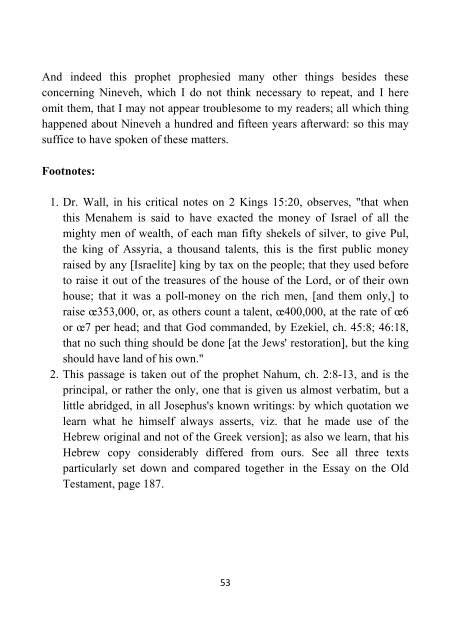You also want an ePaper? Increase the reach of your titles
YUMPU automatically turns print PDFs into web optimized ePapers that Google loves.
And indeed this prophet prophesied many o<strong>the</strong>r things besides <strong>the</strong>se<br />
concerning Nineveh, which I do not think necessary <strong>to</strong> repeat, and I here<br />
omit <strong>the</strong>m, that I may not appear troublesome <strong>to</strong> my readers; all which thing<br />
happened about Nineveh a hundred and fifteen years afterward: so this may<br />
suffice <strong>to</strong> have spoken <strong>of</strong> <strong>the</strong>se matters.<br />
Footnotes:<br />
1. Dr. Wall, in his critical notes on 2 Kings 15:20, observes, "that when<br />
this Menahem is said <strong>to</strong> have exacted <strong>the</strong> money <strong>of</strong> Israel <strong>of</strong> all <strong>the</strong><br />
mighty men <strong>of</strong> wealth, <strong>of</strong> each man fifty shekels <strong>of</strong> silver, <strong>to</strong> give Pul,<br />
<strong>the</strong> king <strong>of</strong> Assyria, a thousand talents, this is <strong>the</strong> first public money<br />
raised by any [Israelite] king by tax on <strong>the</strong> people; that <strong>the</strong>y used before<br />
<strong>to</strong> raise it out <strong>of</strong> <strong>the</strong> treasures <strong>of</strong> <strong>the</strong> house <strong>of</strong> <strong>the</strong> Lord, or <strong>of</strong> <strong>the</strong>ir own<br />
house; that it was a poll-money on <strong>the</strong> rich men, [and <strong>the</strong>m only,] <strong>to</strong><br />
raise œ353,000, or, as o<strong>the</strong>rs count a talent, œ400,000, at <strong>the</strong> rate <strong>of</strong> œ6<br />
or œ7 per head; and that God commanded, by Ezekiel, ch. 45:8; 46:18,<br />
that no such thing should be done [at <strong>the</strong> Jews' res<strong>to</strong>ration], but <strong>the</strong> king<br />
should have land <strong>of</strong> his own."<br />
2. This passage is taken out <strong>of</strong> <strong>the</strong> prophet Nahum, ch. 2:8-13, and is <strong>the</strong><br />
principal, or ra<strong>the</strong>r <strong>the</strong> only, one that is given us almost verbatim, but a<br />
little abridged, in all <strong>Josephus</strong>'s known writings: by which quotation we<br />
learn what he himself always asserts, viz. that he made use <strong>of</strong> <strong>the</strong><br />
Hebrew original and not <strong>of</strong> <strong>the</strong> Greek version]; as also we learn, that his<br />
Hebrew copy considerably differed from ours. See all three texts<br />
particularly set down and compared <strong>to</strong>ge<strong>the</strong>r in <strong>the</strong> Essay on <strong>the</strong> Old<br />
Testament, page 187.<br />
53

















